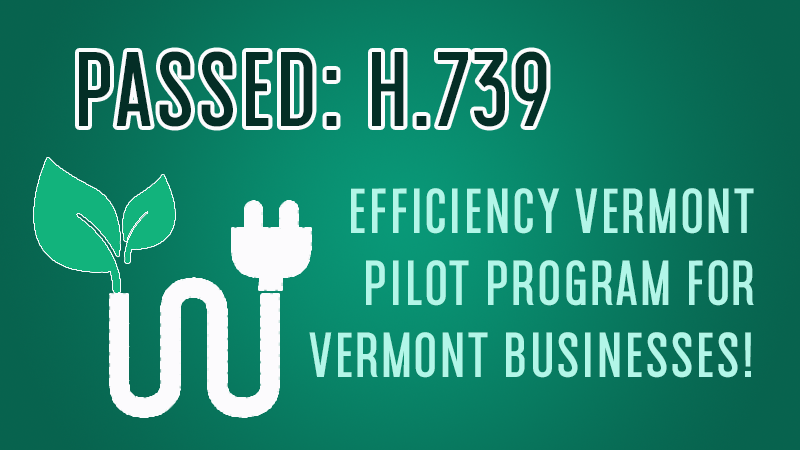On May 21st Gov. Scott signed H.739, which creates a three-year pilot program that allows Efficiency Vermont more flexibility in working with Vermont businesses on custom efficiency and energy saving programs.
While it started as a reaction to the Scott Administration’s proposal to make significant cuts to efficiency programs, we were able to work with key legislators and other advocates for energy efficiency and climate action to turn H.739 into a modest win that preserves the principle of Efficiency Vermont being a statewide program that everyone pays into, and everyone benefits from.
Each business participating in the pilot program will fund their projects with their own energy efficiency charge payments. Instead of these payments going towards Efficiency Vermont’s work broadly, participating businesses will pay into their own energy savings account (ESA), which will then be available for their use on efficiency.
Capped at a maximum of $2 million of efficiency charges per year over the three-year period, the program will allow Efficiency Vermont more flexibility to assist businesses with things like energy storage or reducing peak energy demand.
The bill also requires businesses work with Efficiency Vermont on rigorous planning up front, and that state regulators evaluate the energy savings of each project at the end of the pilot program. By comparing the pilot participants’ energy savings and total energy cost reductions with similar companies that did not participate in the pilot program, the pilot will test both the ESA concept and the idea of broadening the scope of Efficiency Vermont’s work.
H.739 also revised some provisions of SMEEP, a carve-out originally created to allow IBM (now Global Foundries) to opt-out of Efficiency Vermont’s statewide work in favor of spending an equivalent amount of money on their own efficiency work. The bill added OMYA, a mining company, to the SMEEP program. Under the new provisions, these two companies will be required to meet a stricter reporting requirement for their electric efficiency work than Global Foundries previously had – one more akin to the standard Efficiency Vermont is held to.
What started as an attack on Efficiency Vermont, through the hard work of many – in particular the elected officials on the House and Senate Energy Committees – developed into a bill VPIRG was happy to support.
While we have again and again had to defend Vermont’s efficiency programs, through your hard work and tri-partisan support in the legislature, we have continued to keep Vermont moving towards a more energy efficient economy. Much more needs to be done, but H.739 is a small step in the right direction.

